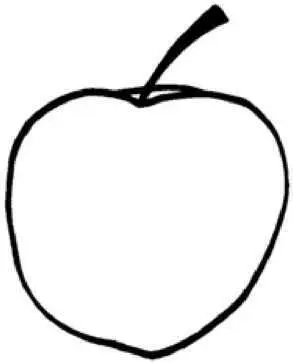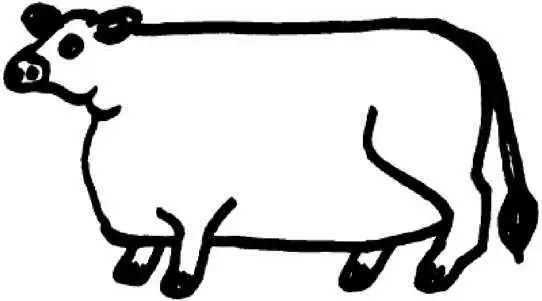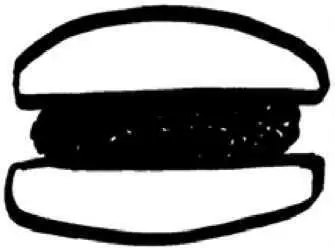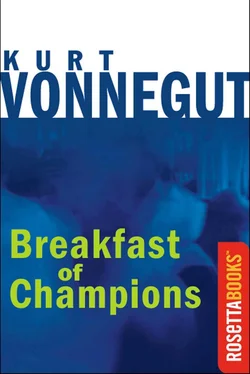Like most science-fiction writers, Trout knew almost nothing about science, was bored stiff by technical details. But no cry from a whistle had got very far from Earth for this reason: sound could only travel in an atmosphere, and the atmosphere of Earth relative to the planet wasn’t even as thick as the skin of an apple. Beyond that lay an all- but-perfect vacuum.
An apple was a popular fruit which looked like this:

The driver was a big eater. He pulled into a MacDonald’s Hamburger establishment. There were many different chains of hamburger establishments in the country. MacDonald’s was one. Burger Chef was another. Dwayne Hoover, as has already been said, owned franchises for several Burger Chefs.
A hamburger was made out of an animal which looked like this:

The animal was killed and ground up into little bits, then shaped into patties and fried, and put between two pieces of bread. The finished product looked like this:

And Trout, who had so little money left, ordered a cup of coffee. He asked an old, old man on a stool next to him at the table if he had worked in the coal mines.
The old man said this: “From the time I was ten till I was sixty-two.” “You glad to be out of ‘em?” said Trout.
“Oh, God,” said the man, “you never get out of ‘em—even when you sleep. I dream mines.”
Trout asked him what it had felt like to work for an industry whose business was to destroy the countryside, and the old man said he was usually too tired to care.
“Don’t matter if you care,” the old miner said, “if you don’t own what you care about.” He pointed out that the mineral rights to the entire county in which they sat were owned by the Rosewater Coal and Iron Company, which had acquired these rights soon after the end of the Civil War. “The law says,” he went on, “when a man owns something under the ground and he wants to get at it, you got to let him tear up anything between the surface and what he owns.”
Trout did not make the connection between the Rosewater Coal and Iron Company and Eliot Rosewater, his only fan. He still thought Eliot Rosewater was a teenager.
The truth was that Rosewater’s ancestors had been among the principal destroyers of the surface and the people of West Virginia.
“It don’t seem right, though,” the old miner said to Trout, “that a man can own what’s underneath another man’s farm or woods or house. And any time the man wants to get what’s underneath all that, he’s got a right to wreck what’s on top to get at it. The rights of the people on top of the ground don’t amount to nothing compared to the rights of the man who owns what’s underneath.”
He remembered out loud when he and other miners used to try to force the Rosewater Coal and Iron Company to treat them like human beings. They would fight small wars with the company’s private police and the State Police and the National Guard.
“I never saw a Rosewater,” he said, “but Rosewater always won. I walked on Rosewater. I dug holes for Rosewater in Rosewater. I lived in Rosewater houses. I ate Rosewater food. I’d fight Rosewater, whatever Rosewater is, and Rosewater would beat me and leave me for dead. You ask people around here and they’ll tell you: this whole world is Rosewater as far as they’re concerned.”
The driver knew Trout was bound for Midland City. He didn’t know Trout was a writer on his way to an arts festival. Trout understood that honest working people had no use for the arts.
“Why would anybody in his right mind go to Midland City?” the driver wanted to know. They were riding along again.
“My sister is sick,” said Trout.
“Midland City is the asshole of the Universe,” said the driver.
“I’ve often wondered where the asshole was,” said Trout.
“If it isn’t in Midland City,” said the driver, “it’s in Libertyville, Georgia. You ever see Libertyville?”
“No,” said Trout.
“I was arrested for speeding down there. They had a speed trap, where you all of a sudden had to go from fifty down to fifteen miles an hour. It made me mad. I had some words with the policeman, and he put me in jail.
“The main industry there was pulping up old newspapers and magazines and books, and making new paper out of ‘em,” said the driver. “Trucks and trains were bringing in hundreds of tons of unwanted printed material every day.”
“Um,” said Trout.
“And the unloading process was sloppy, so there were pieces of books and magazines and so on blowing all over town. If you wanted to start a library, you could just go over to the freight yard, and carry away all the books you wanted.”
“Um,” said Trout. Up ahead was a white man hitchhiking with his pregnant wife and nine children.
“Looks like Gary Cooper, don’t he?” said the truck driver of the hitchhiking man.
“Yes, he does,” said Trout. Gary Cooper was a movie star.
“Anyway,” said the driver, “they had so many books in Libertyville, they used books for toilet paper in the jail. They got me on a Friday, late in the afternoon, so I couldn’t have a hearing in court until Monday. So I sat there in the calaboose for two days, with nothing to do but read my toilet paper. I can still remember one of the stories I read.”
“Um,” said Trout.
“That was the last story I ever read,” said the driver. “My God—that must be all of fifteen years ago. The story was about another planet. It was a crazy story. They had museums full of paintings all over the place, and the government used a kind of roulette wheel to decide what to put in the museums, and what to throw out.”
Kilgore Trout was suddenly woozy with deja vu. The truck driver was reminding him of the premise of a book he hadn’t thought about for years. The driver’s toilet paper in Libertyville, Georgia, had been The Barring-gaffner of Bagnialto, or This Year’s Masterpiece, by Kilgore Trout.
The name of the planet where Trout’s book took place was Bagnialto, and a “Barring-gaffner” there was a government official who spun a wheel of chance once a year. Citizens submitted works of art to the government, and these were given numbers, and then they were assigned cash values according to the Barring-gaffner’s spins of the wheel.
The viewpoint of character of the tale was not the Barring-gaffner, but a humble cobbler named Gooz. Gooz lived alone, and he painted a picture of his cat. It was the only picture he had ever painted. He took it to the Barring-gaffner, who numbered it and put it in a warehouse crammed with works of art.
The painting by Gooz had an unprecedented gush of luck on the wheel. It became worth eighteen thousand lambos, the equivalent of one billion dollars on Earth. The Barring-gaffner awarded Gooz a check for that amount, most of which was taken back at once by the tax collector. The picture was given a place of honor in the National Gallery, and people lined up for miles for a chance to see a painting worth a billion dollars.
There was also a huge bonfire of all the paintings and statues and books and so on which the wheel had said were worthless. And then it was discovered that the wheel was rigged, and the Barring-gaffner committed suicide.
Читать дальше













